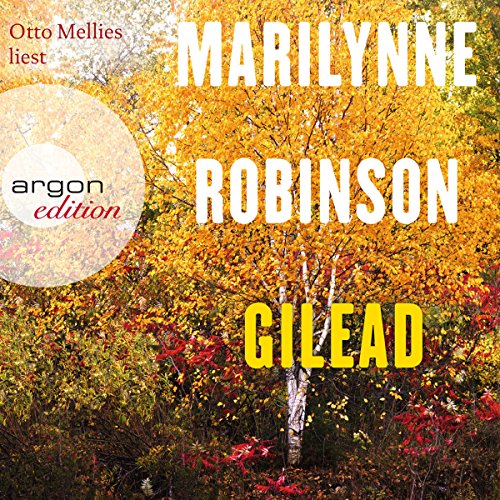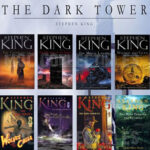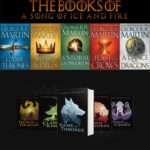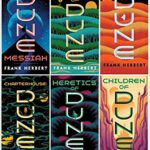Gilead (Gilead) audiobook
Hi, are you looking for Gilead (Gilead) audiobook? If yes, you are in the right place! ✅ scroll down to Audio player section bellow, you will find the audio of this book. Right below are top 5 reviews and comments from audiences for this book. Hope you love it!!!.

Review #1
Gilead (Gilead) audiobook free
First, let me say that Robinson is an excellent writer. Her prose is clear, concise, and at the same time infuses a lyrical grace into her sentences. I think this is the reason that the literary elite have so embraced her books and awarded this novel the Pulitzer Prize. But I believe there are many problems with her approach to this book and to her fiction in general. As many have pointed out, half of this novel is basically a long-winded sermon, and as I read this book, I often thought that she really wants to write a theological treatise, not a novel. What saves the book from utter boredom is the quality of her prose. But the problem goes beyond her interest in theology. She really is deeply nostalgic, and not in a good way. As the hymn that we used to sing in my childhood says, Give my that old time religion, its good enough for me. It may be good enough for Robinson, but it isnt good enough for me.
I feel that the reason that the literary elite has embraced her so readily is that they have failed to realize that Robinson is deeply conservative. She reminds me of the saying a wolf in sheeps clothing. Shes a conservative in liberal clothing. And that has fooled many people unfamiliar with American conservative religion. I grew up in West Texas, in the middle of the Bible Belt. All the people in my family were long-standing Methodists with several ministers in the family genealogy. In fact, my father was a Methodist minister. My family was also deeply conservative, and every single member of the family was a Texas Republican at a time when a majority of Texans were Democrats supporting Lyndon Johnson. So I feel that I can see through the surface liberalism that Robinson seems to evoke when she speaks at a university or some other more liberal setting.
The reason I think this is important is that this novel is really a propaganda piece for conservative religion. John Ames, a Congregationalist minister in the imaginary town of Gilead, Iowa, is the perfect ideal of what a minister is suppose to be. He questions himself on theological matters, he tries to be a good person and not sin, and he shows concerns for Jack, the wayward son a his best friend, another minister in the town. This is all well and good. The problem stems from the fact that her presentation of the religious characteristics of of her imaginary town and Iowa is a complete fantasy. This fantasy is captured at one point when Ames comments, This morning a splendid dawn passed over our house on its way to Kansas. And then Ames quotes from the Bible. Thou wast in Eden, the garden of God… Gilead is like some sort of American Garden of Eden, although for good measure she does touch upon the poverty and problems that Americans have suffered, from the loss of life during the Civil War to the suffering of rural folk during the Great Depression. But I must emphasize that she only touches upon these inconvenient realities. No mention of the thousands of pig farms polluting the drinking water of Iowa and causing a significant rise in cancer. We dont want to talk about that!
For the most part Gilead is a religious utopia. She never really investigates the other side of American conservative religion. My experience with fundamentalist religion was apparently quite different from hers. Although there were many good people in the churches I attended in my childhood, and many of these people were generous human beings, there was a profoundly disturbing side to the religious life of these communities. When I was 12 years old my father, the good minister, was absolutely joyous when Martin Luther King was murdered. Even at such a young age I was shocked by his reaction. How could a man who preached love thy neighbor on Sunday turn around and celebrate the assassination of another person just because that person was black and was working for equality. And sadly, he wasnt the exception to the rule. My entire family, and most of the people in my church, were racist to the core. Of course, they would have denied it vehemently. They would say that they have no problem with Blacks, so long as they stay on their side of the tracks, and leave white women alone. That event, and others like it, made me begin to question the ideas I was hearing in church every Sunday.
Robinson tries to address these issues through her character Jack. But isnt it telling that the one person who questions religion, and also brings up questions about racism in the heartland of America, is also a deeply troubled man who steals in his youth and gets into serious trouble as an adult. Consciously or unconsciously, when Robinson creates a character who questions religion, or questions the contradictions in conservative America, they are always troubled people.
Im sure many apologists for fundamentalist Christianity in America would say that you cant judge the entire ideology based on a few bad apples. But why is there almost a direct correlation between deeply held religious belief and narrow minded attitudes. Although there are many exceptions, from what Ive observed through my many years in the Bible Belt, the more religious a person is the more likely they are to being narrow minded, judgmental of others who dont share their beliefs, and anti-intellectual. Why is it that most of the people who reject science are also conservative Christians. Robinson never even begins to address these concerns because it would damage her comfortable religious beliefs. A question I continued to ask myself as I read this novel is – if her characters were alive in 2016 how would they have voted in the election. I feel certain that they would have overwhelmingly voted for Trump. If Robinson, who has stated that she is opposed to Trump, really feels that way, she needs to ask herself why her novels so support the kind of people who would vote for someone like Trump.
And since Robinson spends so much time talking about theology we should take a closer look at some of her ideas in this area. For instance, she thinks John Calvin has been unfairly maligned. When I first heard her say this I was absolutely dumbfounded. Remember, this is the man who ordered the execution by burning alive of a man by the name of Severus simply because his ideas didnt agree with his own beliefs. Calvin was also anti-Semitic. In his book, Objections of a Certain Jew he argued that Jews misread their own scriptures, and that Jews are a rejected people who must embrace Jesus to re-enter the covenant. Remember also that Luther, the founder of the Protestantism that Robinson so loves, wrote one of the most violently anti-Semitic books ever written, a book that inspired the Nazis to commit many of the thousands of atrocities against Jews. For both Calvin and Luther, the basis of their anti-Semitism, was their deeply held religious beliefs. After the Holocaust, how can Robinson possibly defend someone like Calvin.
In a review of Robinsons latest book Jack by Jess Row in the Los Angelas Times, Row states that Robinson is willing to gloss over a centurys worth of inconvenient facts – from the racial history of Iowa to the doctrinal splits in Calvinist denominations that have produced todays conservative extremists – in service to an idealized common Americanness that fades as soon as you try to bring it into focus. And the great literary critic James Wood has stated that Robinson is illiberal and unfashionably fierce in her devotion to this Protestant tradition…
For all her gifts as a writer, it seems to me that Robinson is a person so deeply immersed in her religious beliefs that she cant really see the reality of America, both its historical reality or the reality we face today in this country. But Isnt this is the one thing that we turn to literature for? When we open a book dont we yearn for insight, for maybe a little better understanding of the complexities of the world we live in? Robinson is unable to give us that.
Review #2
Gilead (Gilead) audiobook streamming online
The works of Marilynne Robinson have been a gap in my reading. I am a protestant minister and one of my most faith-filled members has read everything Robinson wrote, so I thought it high time to read her. This book astounded me. As an old preacher, I was stunned how Robinson captured so much of the ambiguity, deep rooted faith and experiences of a life long parson. Does that sound a little confused? It may be. Marilynne Robisnon captures it all. The minister in the book has a rock solid faith, but a realistic opinion of his work. The descriptions of his work as a preacher hit home. Two thirds of the way through this incredible book, I knew that when I reached the last page, I would start it over again to revisit its power and to capture what I might have missed. If you are a minister, you must read this book. Robinson demonstrates the extraordinary in the ordinary. She shepherds us up to our own death and helps us face it with confidence. She validates our lives in places where we wonder if they have had any impact. She makes clear the power of the church. The little church in Gilead where Ames preaches will die when he does. But that does not mean the death of faith. The victory is just under the surface. Just under the surface, filled with wonder and majesty. This book is an amazing unveiling of the truth of the Christian faith, barely hidden behind the curtain of human mortality. Robinson’s guided tour of the dusty, dry insignificant town of Gilead is a walk through the deepest of our human experience. She shows us how to celebrate life and God and appreciate every last thing about this life and the life to come.
Review #3
Audiobook Gilead (Gilead) by Marilynne Robinson
Gilead is a slow-burning novel told in retrospect by an old Midwestern minister facing death. It is scattered and covers a wide range of experiences, as the minister’s letter–meant for his child, who is too young to understand it yet–jumps between his childhood, his father’s childhood, his time in seminary, the family drama of his neighbors, and his own love story with his much-younger wife. But the heart of the story is beautifully human and contemplative.
This is not a story for the inattentive, or even for those who simply prefer a straightforward plot. Gilead’s storyteller weaves back and forth between at least five different sub-plots, sometimes jumping ahead in one before telling us the meaning of the other. One almost needs to read it twice, simply to see again what he meant he made the reference to his grandfather in the first part of the story, before we had ever met his grandfather or known about his relationship with him. There is a central narrative of events that take place in the story’s present, as the minister is writing, but this narrative is often sidelined by the stories of the past or general philosophical asides on Calvinist doctrine.
This may make the book sound dull or didactic, but in fact it is neither. The Calvinist doctrine comes across more as a character trait than as the author preaching at the reader, and reflect more on the self and the needs of the soul than on the nature of sin and the cosmos. And while the book is definitely slow and contemplative–even the stories of the past rarely ascend beyond a shouting match, the human drama at the heart of it makes the entire story compelling in a way that should resonate with many readers. The minister has fears, doubts, and regrets like any man, but he is also, unquestionably, a good man, looking back at his life and struggling with jealousies and resentments he knows are unjustified. He is a good man without being an idealized one; a refreshing thing in modern fiction.
Gilead is not a fiery book. It is not a fast book. It does not explode with passion or shout for your attention in the normal ways. It is wandering and thoughtful and at times conflicted. It is, in fact, most like sitting in the living room with a very old friend, talking of days that have gone by and days that are to come. It is a book for people of all ages, races, and creeds, and a book I thoroughly recommend.
Review #4
Audio Gilead (Gilead) narrated by Otto Mellies
Gilead is the story of John Ames, a preacher in the church, who has inherited his fathers and grandfathers mantle. Having been married and lost his wife and child, he has married again in his old age, and has a young son. It is to him, that Ames addresses this first person story. However, to me, it is not a story – it is simply a very long ramble, with someones philosophical thoughts thrown in.
The book describes a bit of his relationship with his wife and son, and with his parents and grandfather, and his good friend Boughton. It throws in one or two anecdotes, but particularly in the latter part of the book, it focuses on John Ames Boughton – the black sheep son of his friend – who has returned to Gilead. As John Senior approaches death, he is particularly worried about Jack, his namesake, who, he believes, has designs on his wife and child. Jack is aware of his disapproval and they have several discussions, where Jack seems to be asking for forgiveness for past sins, and John seems unable to put aside his suspicions about him. Finally Jack reveals his secret concerns, and suddenly, John thinks of him in a different way, and wants to bless him and help him.
Once again, I am looking at the reviews on the back page of my current reading circle read, and wondering if I am incredibly shallow, because I cannot work out why the reviewers think so highly of this work. Dazzling originality/ perfect pitch/a great work of literature are some of the comments. Yet again, a set of reviews, full of praise which I cant echo.
In fact, this book sent me off to sleep so many times, it could be recommended as a useful sleeping draught.
One third of the way through the book, all I could say was that there were some pages which made me smile, some curious, but on the whole, I came back to these ramblings of an old man, not remembering what I had read before. Perhaps this says more about me than about the book.
Towards the end of the book, I thought we were moving towards some sort of a denouement, but it just didnt happen. There were occasional references to matters mentioned earlier on in the book, but it felt as if I had been reading the book for so long, that I couldnt any longer remember the beginning.
Aside from not finding much of a plot, or much interest in his story, I could not empathise with John, and for a preacher, I did not find him full of the milk of human kindness.
I would have been interested to know more about the back story of Johns wife. What made her marry an old man? And why was a certain emphasis put on her uneducated status, actually in a rather patronising way by John, without it being followed through. I thought more could have been made of their meeting and their decision to marry. Was the child really his, or did she marry John to give the child a father. For some time, I thought that Jack was the father of the child, and that might have been an interesting development. However, instead of this, was this sprawling non-story, masquerading as a novel.
I cant give it more than 5 out of 10, which would equate to 2.5 stars, but Im not feeling that generous, so its 2.
Review #5
Free audio Gilead (Gilead) – in the audio player below
In think Marilynne Robinson is rightly regarded as one of America’s finest living writers. When reading her books you feel like you are in the company of a highly intelligent, reflective and articulate writer. This of course means the writing isn’t always easy and if you have a tendency to skim read you will miss a lot of what is on offer.
The thoughts and ideas of the reverend who narrates this book through writings to his son are so well developed that it seems to me that they must, at least in part, reflect the ideas of the author herself.
Some of the writing is philosophical in character and does need more careful attention then you might usually give to a novel. For example, when the reverend explains his view on our inability to understand the nature of God he writes :
” … if God is the Author of existence what can it mean to say God exists? There’s a problem in vocabulary. He would have had to have had a character before existence which the poverty of our understanding can only call existence. That is clearly a source of confusion”. Not your standard fare!
But, don’t get me wrong, the book is not all hard going and it does contain an interesting story, especially in the second half (which I wont spoil).
If I was to quibble with the book at all (and sometimes you simply feel not worthy to do so with some writers) it is that I didn’t really like the book being presented as the writings of an elderly dying reverend to his very young son. I found this a bit of a distraction and would have preferred it to have been presented as a memoir to be read by me the reader.
But make no mistake Marilynne Robinson is a stellar writer, and this book has prompted me to investigate her more academic writings. I am partial to the writings of people like Dennett and Dawkins who she apparently attacks, so it should be interesting to see what she has to say on the limits of science.
Recommend Books
Galaxyaudiobook Member Benefit
- Free 2000+ ebooks (download and online)
- You can see your watched audiobooks
- You can have your favorite audiobooks
Galaxy audio player
If the audio player does not work, please report to us, we will fix it as soon as possible (scroll up a little you will find the "REPORT CONTENT" button).












0 Comments: